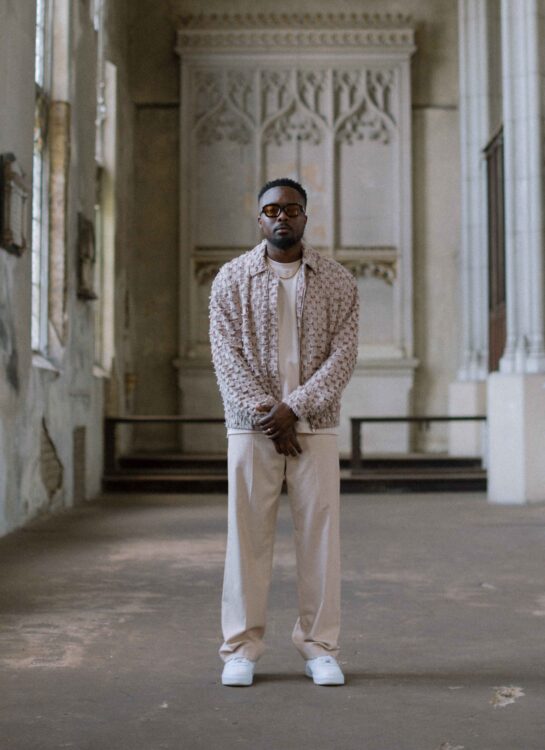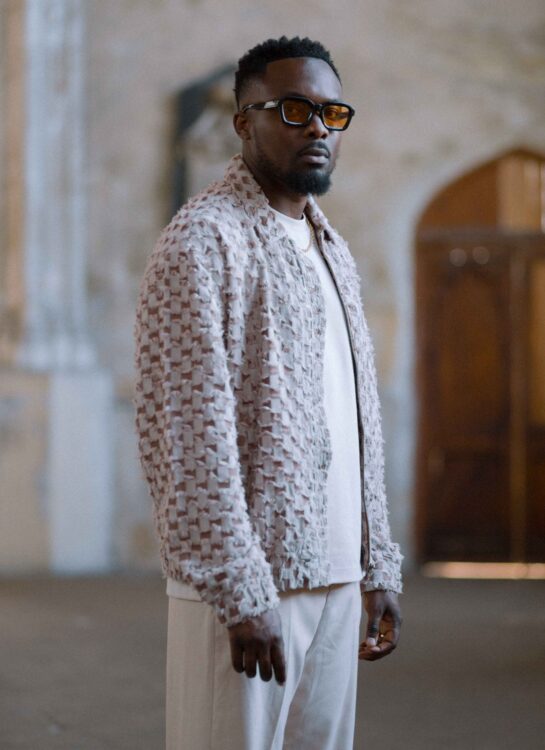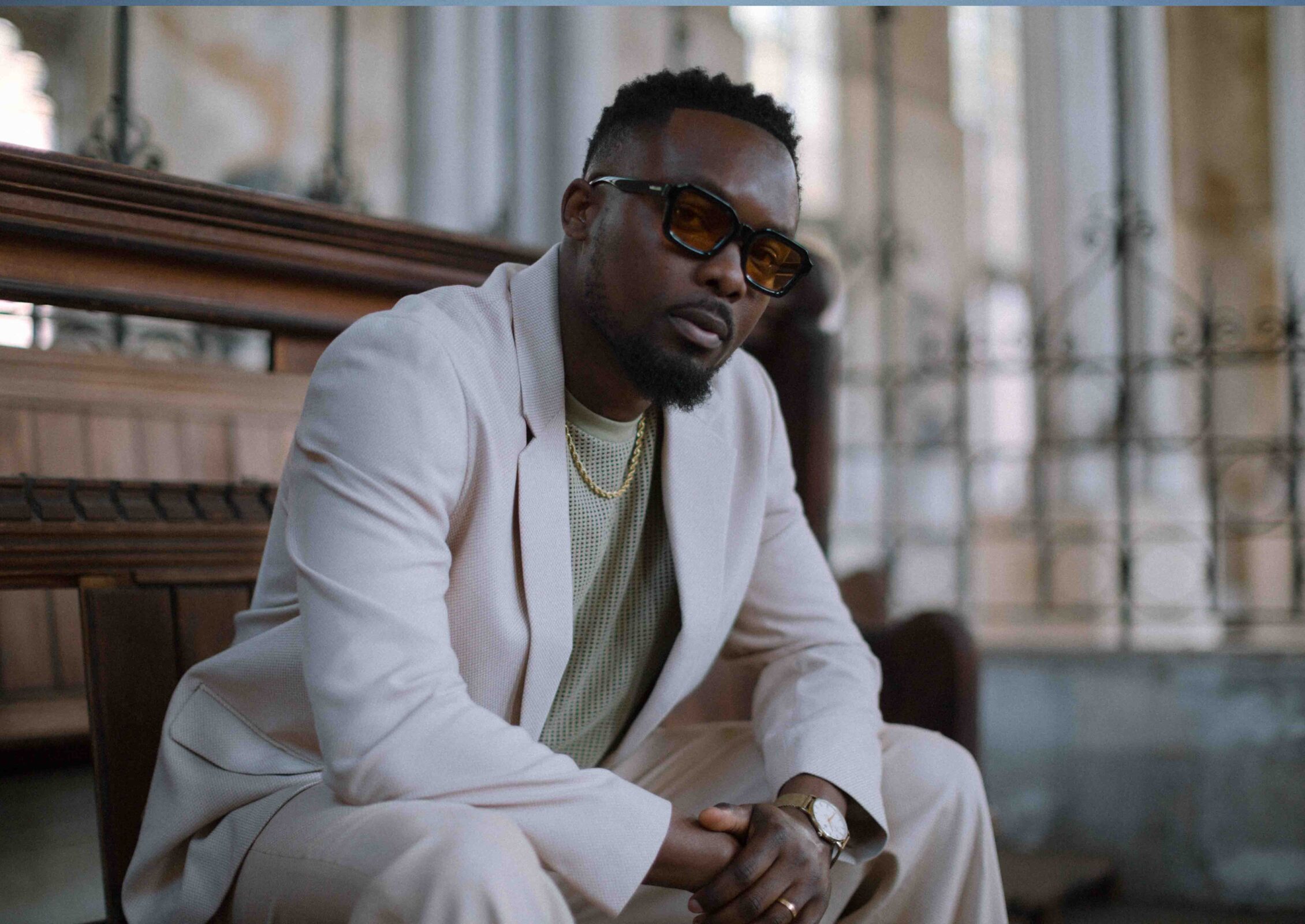- Words Notion Staff
As he releases his highly anticipated third studio album, When Faith Feels Far, MOBO Award-winning rapper Faith Child opens up about grieving his father, giving language to doubt and weaving rap, and his genre-bending sound.
Faith Child’s new album When Faith Feels Far doesn’t just ask questions; it sits in them. Written in the wake of his father’s passing and during a time when belief felt more like muscle memory than conviction, the 15-track record is perhaps his boldest and most vulnerable yet. Where previous projects leaned into faith’s triumphs, When Faith Feels Far explores its tremors, including doubt, grief, and spiritual fatigue, and still manages to find light flickering at the edges. From the stripped-back intimacy of ‘Good Mourning’ to the defiant praise of ‘Oluwa Is Involved,’ this is an album unafraid of the valley, but deeply committed to walking people through it.
But this isn’t just a confessional; it’s a communal offering. Across collaborations with Erica Campbell, CalledOut Music, Joe L Barnes, and more, Faith Child creates a space where scepticism is met with grace, and worship is built not on perfection but perseverance. He raps with clarity, but lives in nuance, stretching gospel into new sonic spaces, weaving in Afrofusion, electronica, rap, and pop.
In conversation, he’s just as open, reflecting on the weight of loss, the discipline of joy, and the kind of faith that holds on even when it can’t feel a thing.


When Faith Feels Far is a striking title. Was there a specific moment or season that gave you that phrase, and how did writing from distance, as opposed to certainty, shape the album’s voice?
The album actually started with a different name, but as I kept writing, I found myself coming back to the pandemic. That season felt like distance on every level, distance from people, from certainty, even sometimes from God. I think a lot of us had more questions than answers then, more fear than faith.
That space shaped the voice of the record; it’s honest, it’s vulnerable, and it doesn’t try to polish over the doubts. For me, that’s part of faith. If we had it all figured out, we wouldn’t need faith in the first place. There’s strength in admitting you need help, and I wanted the album to carry that kind of hope.
You’ve spoken about losing your father. On ‘Good Mourning’ you hold prayer and goodbye in the same hand, what did it take emotionally (and practically) to hit record on a song that honest?
I actually wrote verse one a couple of days after hearing my dad was on life support, and then verse two about six weeks later when he passed. Those weeks gave me time to process what was happening and almost prepare myself for what was coming. In verse two, I say, “death is the friend of a righteous man going home”, and that’s really the hope I held onto.
As Christians, we talk a lot about heaven, but the only way there is either via rapture or death. So while it was devastating, I found peace in knowing my dad wasn’t in pain anymore, he wasn’t carrying the weight of this world, he was finally at rest. Recording it was tough, but it was also healing. Grief isn’t a place you arrive at; it’s more of a journey, and the weight doesn’t necessarily get lighter; you just learn how to carry it better.
‘Unbelief’ draws on Mark 9. How did you give language to doubt in a way that welcomes sceptics and still serves people whose faith is hanging by a thread?
What I love about Mark 9:24 is that it shows us God cares more about honest prayers than polished ones. The young boy’s father says, ‘Lord, I believe, but help my unbelief,’ and Jesus still answers him. That always stuck with me, especially because I grew up hearing that unanswered prayers came down to a lack of faith. But here you see someone admit their doubt and still encounter God’s power.
That’s what I wanted the song to capture, that tension we all feel between knowing God can and wondering if He will. I think that speaks not just to people hanging by a thread, but even to sceptics. It’s a reminder that God welcomes us in weakness. We don’t need to have it all figured out before we come to Him.
‘Church Hurt’ and ‘A Million Miles’ extend empathy and apology. In your view, what does real accountability inside faith communities look like, and how do you protect your own heart while writing about those wounds?
For me, real accountability looks like owning when we get it wrong, creating space for the wounded to be heard, and taking steps to help them heal. It’s hard for people to move forward when it feels like the ones who caused the hurt face no consequences. Writing about that can be heavy, and it would be easy to get bitter, but I try to hold onto hope.
God really does heal and restore, and remembering that keeps my heart soft. At the end of the day, we’re all flawed people in need of grace. And I’ve learned that the moments we feel furthest from God are usually the moments we need to run closest to Him.
The record opens with ‘Catfish’ and closes with ‘Cardio.’ Why those bookends? What story do the first and last tracks tell about the journey in between?
Sometimes we shy away from asking for help because we’re estranged from the very people who could help us. ‘Catfish’ is a hard-hitting track that sets the tone, letting us know that our flaws and all are welcomed, and God’s love for us isn’t dependent on our performance. ‘Cardio’ serves as a reminder that we can always come home, no matter how far one may stray. These songs bring home the message that whenever we feel distant from God, we’re not alone; He’s closer than we think.

Sonically, you weave rap, gospel, electronica, afrofusion and pop with producers like Komenz, Alex E, Tytanium and GKiD. Which track changed the most in production, and what surprised you about where it landed?
It would say ‘Holy Place’. It started off as a rough voice note demo and turned into a musical masterpiece. Upon being produced, the live instrumentation and the choir vocals took the song to another level. I love live music, and I’m quick to grab any opportunity to capture that when making music.
‘Oluwa Is Involved’ hit #1 and “Wildfire” kept the momentum. Did that early reception influence sequencing or singles, and how do you avoid triumphalism while still writing praise that feels true?
At first I was actually hesitant about putting ‘Oluwa Is Involved’ and ‘Wildfire’ back-to-back. But when I sat with the team, we broke the album down into themes and sounds, and that sequencing just made the most sense. As creatives, we’re always trying to top our last hit and chase the high of that success. I definitely did after my first album. But I’ve learned to shift the focus from chasing numbers to just making honest, good music. If the music is good, the people will resonate with it.
You’re taking these songs across Europe this autumn. How are you staging the emotional arc live – where do you build in space for silence, testimony or communal sing-back?
The studio is great, but nothing compares to taking these songs on the road. I usually like to kick things off with high energy, then bring the pace down in the middle for those reflective, intimate moments, and close with a big celebration. I write with live performance in mind. I’m always thinking, ‘How will this song feel in a room full of people?’
So the goal is that the whole night feels like one big sing-along, whether the track is upbeat or mellow. In between songs, I’ll sometimes rap a cappella to drive home the message, and before the big closing celebration, I share my own testimony of life and hope. That way, the celebration isn’t just hype, it’s grounded in something real.
You often share your origin story – your mum choosing to keep the pregnancy – and you mentor young creatives in schools. When faith feels far for them (or for you), what practices or guardrails actually keep you moving?
My faith is my anchor. It’s what keeps me steady when things get rocky. I’d say community is just as important. I’ve got family and friends who will send me a verse or a text at just the right time, and that has carried me through a lot. For the young creatives I mentor, I always say, “Don’t be ashamed to ask for help.” You’ll find you’re never the first person to walk through that struggle, and there’s strength in sharing it. The very practices that keep me going – faith, prayer, community- are the same ones I encourage them to lean on when faith feels far.

